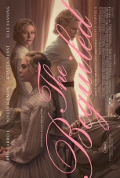
Directed by
Sofia Coppola
91 minutes
Rated M
Reviewed by
Bernard Hemingway

Beguiled, The (2017)
Synopsis: During the American Civil War, a small private girls' school is disrupted by the arrival of a wounded soldier (Colin Farrell).
Sofia Coppola‘s first two features, The Virgin Suicides (1999) and Lost In Translation (2003) earned her an enormous cachet of goodwill. It is one that she has been drawing on ever since but despite being a festival favourite over the years (she won Best Director at Cannes for this film) without comparable critical success.
Coming hard on the heels of A Quiet Passion and Lady Macbeth coincidentally The Beguiled is also set in the mid-1800s and also deals with the unruly female libido in conflict with repressive Victorian piety. If the former was about surrender and sublimation, the latter about rebellion and gratification, Coppola’s film is somewhere in the middle. Her women ultimately surrender to the dominant order but do so on their own terms.
As a film that on a symbolic level serves as a metaphor for male castration by the female it suggests ripe subject matter for a woman director but rather surprisingly the 1971 Don Seigel/Clint Eastwood version tackled this insistent sub-text with greater directness.
Coppola, who wrote the screenplay but gives credits to both Thomas Cullinan’s original novel and the Albert Maltz and Grimes Grice (a pseudonym for Irene Kamp) 1971 screenplay, largely distances herself from the physical (barring a brief episode of brute coupling between McBurney and Kirsten Dunst's Edwina) and for that matter from the wounded soldier himself and focuses instead on portraying the carefully-controlled world of the isolated all-female community. Rather disappointingly, at least for me, the effect is more reminiscent of Peter Weir’s crinolined atmospherics in Picnic At Hanging Rock (1975) than the visceral immediacy of the 1971 version.
Unsurprisingly, the ensemble of women young and old (Oona Laurence, Elle Fanning, Angourie Rice, Addison Riecke, Emma Howard, Coppola regular Dunst and Nicole Kidman) are all fine in a film whose visual design is striking. Much like the other two period films mentioned, the production values across the board are top drawer. Coppola keeps the settings (which are only the inside and outside of a classic Southern mansion) spare and simple with cinematographer Philippe Le Sourd using barely enhanced natural light to give it a painterly look particularly when the surrounding Gothically picturesque woods are concerned.
For all that, Coppola’s shift of focus from the male to the female(s) comes at a price. Not enough time is spent on allowing McBurney to emerge as the catalyst in this hot-house environment. As the main protagonist his behaviour is on cue with the demands of the plot but Coppola doesn’t give Farrell, who would have been well capable of doing more, the opportunity to develop his character in a credible way. Even the portrayal of the women feels too superficial, Coppola keeping her three principals, Fanning, Dunst and Kidman mainly in mid-shot and often in deep shadows while never really allowing them to become more than their typology of tease, lonely romantic and ice maiden respectively. In general, Coppola's tendency to over-aestheticise her stories, a tendency indulged in most damagingly with her 2006 film Marie Antionette, here results in an incongruously distant treatment of her subject matter, even more obviously so if compared to Seigel's blunter but more telling version.
Despite these shortcomings The Beguiled is an impressively-directed film and worth seeing particularly in conjunction with those other films mentioned.
FYI: Anyone interested in the subject matter might also like to track down Michael Powell and Emeric Pressburger's thematically-related Black Narcissus (1947).

Want more about this film?


Want something different?




